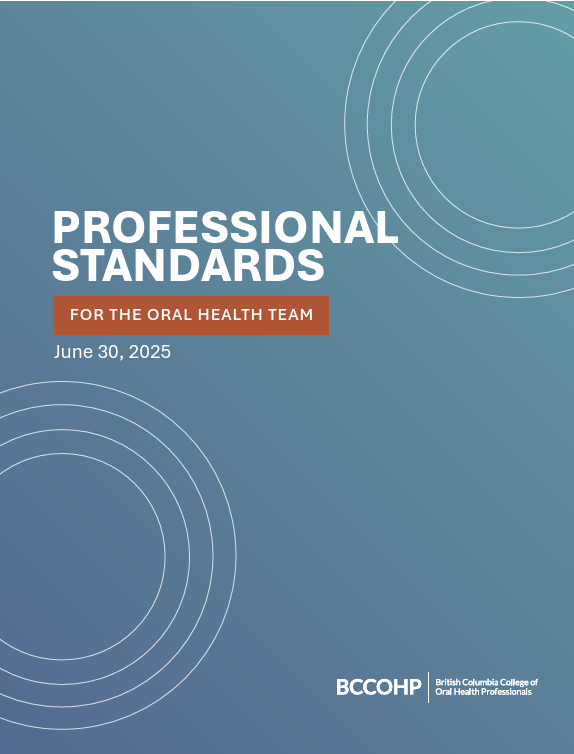Menu
Profession-specific resources provide important information for oral health professionals in meeting BCCOHP expectations. These profession-specific resources are to be read and considered in conjunction with the Professional Standards for the Oral Health Team (effective June 30, 2025).
Oral health professionals are responsible for reading BCCOHP’s news and publications to ensure they are aware of current expectations, and are accountable for understanding and interpreting any limits or conditions that might appear in Ministry Regulations and BCCOHP Bylaws regarding restricted titles and scope of practice.
Many of these resources listed below were developed by the legacy colleges before the amalgamation of BC’s four oral health regulatory colleges in 2022 and the introduction of BCCOHP’s Professional Standards for the Oral Health Team. The following legacy documents remain applicable while BCCOHP is in the process of rescinding and replacing legacy resources. Note that eventually, all legacy practice resources will be rescinded and replaced by new BCCOHP standards that apply to all regulated oral health professionals. Learn more and review the inventory of documents being replaced by these new standards here>>
Please reach out to BCCOHP’s Professional Practice team if you have any questions regarding the provision of any aspect of practice or defined restricted activities.
BCCOHP’s unified Professional Standards for the Oral Health Team are now in effect for all oral health professionals. These comprehensive new standards outline the minimum expectations for ethical conduct, performance and professional behavior for all oral health professionals in BC. They are designed to support professional accountability and help ensure consistent, competent care across the professions.

Read the new Professional Standards >>
Eventually, all legacy practice resources will be rescinded and replaced by new BCCOHP standards that apply to all regulated oral health professionals. Learn more and review the inventory of documents replaced by these new standards here>>
The dental laboratory environment is potentially a source of many infectious diseases.
Health professionals working in a dental laboratory environment may be exposed to hepatitis, aids, herpes or other infectious diseases through contact with blood, saliva and debris on impressions, dentures, crowns, bridges, appliances and other items or, in some instances, through direct patient contact.
Awareness of infectious disease control is the responsibility of the health professional. Dental technician registrants should be aware of the potential risk to themselves, or the potential loss of income or legal action that may occur if they spread infectious diseases to someone else. There are many sources of information and education regarding appropriate infection control measures for the commercial laboratory.
BCCOHP does not promote or support any specific product or system to address infection control. It does however currently recommend that:
Registrants observe minimal standards of infection control and ensure there is a system in place to disinfect:
The College recommends that all dental technicians have the following MINIMUM program in place: